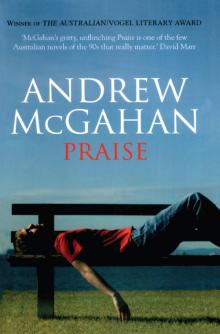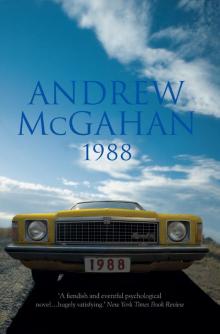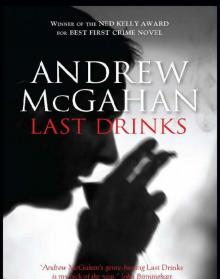- Home
- Andrew McGahan
The Rich Man’s House Page 4
The Rich Man’s House Read online
Page 4
‘Oh, yes,’ Rita said, after a gap. ‘What do you do for him?’
The woman gave a quirked smile, and Rita knew, the way the drunken do, that she was sober, had not taken a drink all day. ‘I’m the chief of his private staff, although the title he prefers is major-domo. I manage his day-to-day affairs. He sent me to be his representative here today. I’ve passed on Mr Richman’s condolences to your stepmother and stepsiblings already—but I did not want to miss you. You especially.’
Rita swayed a little, flushed and self-conscious now. ‘Well, that’s very kind of you.’ But couldn’t this have been done earlier, instead of now, when she was leaving, and so damn woozy?
The woman nodded as if understanding. ‘In truth, I wanted a moment alone with you, away from attentive eyes and ears. I have a private message for you from my employer.’
‘From Walter Richman?’
‘Yes. He has a request to make of you.’
Another sway. ‘What?’
The woman’s calm gaze seemed to note the sway, and her lopsided smile came again. ‘Well, this isn’t the best time to discuss it. Not at your father’s funeral service. And you’re about to leave anyway, I see.’ Her hand slipped deftly into a small handbag and produced a card, held it forwards. ‘In two weeks from now, I’ll be in Melbourne on business. Perhaps I could meet with you then in more relaxed circumstances?’
Rita took the card, noting that the woman’s right hand was missing its little finger, a slim white scar the only remainder. Half of the fourth finger was missing as well. ‘If you like, yes.’
‘Good. I’ll call you. I have your number, if you can excuse the liberty. Your stepmother’s legal people gave it to me.’
And with a nod, the woman withdrew, slipping off towards the exit without giving anyone else in the milling crowd a glance.
Which sent Rita baffled to her taxi.
When she woke the next morning, hungover and wrung out, with those calm eyes, blonde hair and a maimed hand hovering in her mind, she might have thought the encounter was only a dream, tacked onto her memories of the actual party. Except that when she went through her bag, the card was there, plain but elegant.
Clara Lang, it said.
And nothing else but a mobile phone number. There was no email address, no job description, no title, no company or function. But it proved at least that she was real. Her, and Walter Richman.
But what could it all be about?
Rita gave a mental shrug. Time would tell, and she needed to get going. She was due back in Melbourne for work and had a tedious twelve-hour drive down the Hume Highway ahead of her. The trip would have been just an hour by air, of course, but there was no point reminding herself of that. Even now, after everything else she had repudiated and dismissed from the old days, she could still not go near a plane.
She made for the shower.
2
DEPORTED
section of article,
Sydney Morning Herald, 2004
Daughter of Architect Detained at LA International Airport
Rita Gausse, daughter of renowned architect Richard Gausse, has been detained by authorities in Los Angeles after disruptive behaviour on her United Airlines flight from Melbourne. Reportedly under the effects of alcohol and other unnamed substances, Ms Gausse was restrained during the flight by staff and passengers. She has been denied entry to the United States and will be returned to Australia. It is understood that Ms Gausse, who was travelling with a female companion, was intending to visit the USA as part of a promotional tour for her recently published book, the …
3
AN INVITATION
True to her word, Walter Richman’s major-domo phoned a week later to set up an appointment.
Where, Clara Lang wanted to know, would Rita like to meet? They could make use of a conference room at the major-domo’s hotel—the Park Hyatt, by the cathedral—or meet in a restaurant or café. Or would Rita prefer to play host in her own home?
Rita was ready for this. She had by then researched the name Clara Lang and confirmed that the woman was indeed who she claimed. While not exactly famous, she was, as the right hand to Walter Richman, certainly a known figure in the corporate and society world. There was even a Wikipedia entry about her.
It was brief, but enlightening. Born in Germany in 1963, she had lived in the USA since age eleven, which explained the accent. In her younger adulthood she had been a professional mountain climber, which added up too, seeing she now worked for the most famous climber of all time. However, a serious injury (unspecified) had led her to cease mountaineering in 1990, after which she had studied economics and business, developing a role as a corporate consultant, training young executives in teamwork efficiency and problem solving. It was via this avenue that she had come to meet Walter Richman in 1996, who took a liking to her—one climber to another, presumably—and offered her a job on his personal staff; a staff which, twenty years later, she had now headed for a decade.
All legitimate, but the question remained for Rita: where to meet? The thought of this forbidding woman—former mountain climber (a very good one, according to the article, a pioneer in a time when female climbers were a rarity) and now steward to one of the richest and most powerful men in the world—sitting down for coffee and biscuits in Rita’s modest Ikea-furnished apartment, with Simon, the regulation woman-living-alone cat, rubbing and purring around her ankles … well, no, it wouldn’t do at all. And yet the notion of encountering the major-domo in some sterile hotel conference room, or over a white tablecloth in a stiffly formal five-star restaurant, was even worse.
So Rita settled on a café near her flat, down on the river—home ground, but to some degree neutral. Clara Lang agreed readily, although admitting that she was unfamiliar with exactly where the Edgewater Estate development might be found. ‘It’s not far,’ Rita assured her, ‘only seven or eight kilometres west of the city. Fifteen minutes in a taxi.’ Or, she supposed, in a corporate limousine.
On the appointed day and hour she left her flat and made the short walk to the rendezvous, descending the steep street that led from her apartment block on the lip of the Maribyrnong valley down to the riverbank. It was a beautiful sunny autumn morning, and the river itself was glinting coolly blue as it curved through parklands towards Footscray and its junction with the Yarra beyond.
At the base of the slope was Edgewater Square and a small area of cafés and restaurants, including Rita’s regular haunt. She arrived five minutes early to find Clara Lang already seated at a table on the deck in the sunshine. Her clothes matched the setting. Rita had half expected business attire, but instead Walter Richman’s emissary was wearing jeans, heavy hiking boots and a T-shirt, an unneeded jumper slung over the back of her chair. She was staring out over the water, but turned as Rita approached, and rose quickly, an economy of movement apparent in her, a mountain climber’s litheness perhaps.
‘Rita,’ she said, hand extended. ‘So good to see you again, on such a nice day.’
They shook hands lightly, Rita fleetingly aware of the absence of the major-domo’s little finger. Casually dressed or not, Clara Lang looked every inch assured and capable. The set of her narrow face was cool, Germanic in its self-possession, and it was only the odd blunting of her nose that gave any hint of fallibility.
With the greetings exchanged, and Rita settled, and their coffee orders taken, the major-domo nodded towards the view, walkers and cyclists moving on the riverside paths. ‘I have visited Melbourne many times, especially in the last few years, and yet I never knew it had a second river. I thought there was just the Yarra.’
‘You’re not alone in that,’ Rita replied, noting that the major-domo had pronounced Melbourne correctly, without the mis-emphasised first syllable and the elongated second syllable common to Americans. ‘The Maribyrnong often gets forgotten. It was an open sewer for most of Melbourne’s history, although it’s been cleaned up a lot lately as the western suburbs have gentrified.’
&
nbsp; Clara nodded, shifting in her chair to consider the café complex around them, the Edgewater square beyond, and behind that the glass- and-steel townhouses and apartment blocks of the estate, crowding up the slope. ‘Yes, this certainly all looks new. What was here before?’
‘Right here? This area was a munitions factory and storage depot. There’s still an old magazine intact behind those buildings over there. But further along the river there were abattoirs and tanneries and chemical plants, all types of heavy industry.’
‘You would not guess it now,’ Clara observed. ‘Which really is a deceit, to my mind,’ she added, with a bluntness that made her seem quite German indeed for a moment. ‘Generic redevelopments like this, they give no sense of place or time or history.’ But her smile was good-humoured as she eyed Rita. ‘I only say that because it’s not the sort of place I would have thought the daughter of so daring an architect as your father would choose to call home.’
Rita suppressed a sour smile. Well, no … there was a time when she would not have expected it either, a time when she would have scorned an estate like this, a stock-standard middle-class ghetto without a trace of architectural substance, or even of basic homeliness.
‘It’s a matter of budget more than choice,’ she lied primly. ‘Early on in their careers, vets don’t earn a fortune. They don’t in their later careers either, most of them, come to think of it.’
‘Early in your career?’ Clara considered. ‘Yes, of course, it’s easy to forget, but you have started late as a vet, haven’t you. After your … former profession came to an end.’
So she knew about that. Lord. Now the major-domo would ask why Rita—after such a ‘shall we say alternative’ past—had chosen to become something as practical and mundane as a vet.
But in fact Clara didn’t seem interested in earlier lives. ‘Where do you work now?’
Rita pointed to the far bank of the river and the inner suburbs beyond, and explained about the hospital and the night shifts.
‘You enjoy night shifts?’
‘I do, yes. Plus it’s only me these days, so it doesn’t matter if my hours are unsocial.’
Again, the major-domo showed no inclination to pry, leaving only me and these days unquestioned, or perhaps she already knew about all that too. She was looking at the water again. ‘These walking trails along the river. Do you use them?’
‘I do. Further upstream there are some nice parks. You can go for miles.’
‘You’re a keen walker?’ Clara enquired, with a look that was sizing up Rita’s physique.
‘I suppose so.’ There was no supposing, Rita walked a lot. It was one of the few habits she had kept from the old days, although now she restricted herself to urban routes. But although she was fit enough, there was no denying that she was somewhat more full-fleshed than the trim majordomo. ‘What about you? You used to be a serious mountain climber, I saw online. Do you still climb at all?’
The ironic smile came again. ‘No, I don’t do much climbing anymore, or even much serious walking. I’m forced to rely on the gym.’
‘No spare time?’
‘That too,’ agreed the major-domo, and folded her maimed right hand over her left.
And suddenly Rita had it. The undisclosed injury mentioned in the Wikipedia article—it had to be frostbite. Rita knew next to nothing about mountaineering, but she knew about that at least, how climbers often ended up with extremities frozen solid, later to turn black and rotten and require amputation. And, yes, facial features too, like the tip of a nose. Not that two lost fingers and a blunted nose would ruin a climbing career—but Clara had mentioned walking. Her toes.
Rita glanced at the major-domo’s shoes. The heavy hiking boots gave nothing away. But Rita remembered now that the major-domo had also worn long boots at the funeral, and that there had been an upright formality in the way Clara had walked away that night. She had thought it was a natural stiffness, but what if it was rather something careful, something artificial, learned in a rehab ward?
Rita’s gaze lifted, found the other woman watching her steadily. At which point the coffees arrived to break the moment. After their first sips, the major-domo straightened and took on a brisker tone.
‘Before we come to the business at hand, I should say first that I knew your father quite well. We worked together often in the last few years at the Observatory. I liked him very much.’
‘I’m glad,’ Rita replied. ‘But then you must know he and I weren’t very close.’
‘He mentioned that, yes, though of course it’s none of my business. But if I might enquire, what has happened to his ashes? I forgot to ask Amanda what she intended to do with them.’
‘He requested in his will that his ashes be released into the surf at Clovelly beach in Sydney. It was his favourite place to swim. I don’t know if Amanda has done that yet, though.’
‘Ah. His will. Did you know that I was a signatory to it? He made some alterations to it a couple of years ago, and I happened to be at hand. I remember that he said he was making changes to his bequests regarding you. And of course he died a very wealthy man.’
Rita blinked. It was shock, yet again, like watching Walter Richman on the big screen at the funeral, to find that a stranger was so intimately involved with her own family affairs.
‘Yes,’ she said, ‘he told me he was going to do that. I wasn’t in his old will, from the days when we didn’t speak at all, but after we made up he wanted me back in. I told him his money should really go to Amanda and her kids, they were far more central to his life than I was. So he promised he would keep my bequest small. Which he has.’
Out of all Richard Gausse’s fortune, garnered over a lifetime of designing for the rich—the commission on Richman’s house alone had been close to twenty million—Rita had been left just five hundred thousand dollars, along with some art works that had belonged to her mother. Rita was grateful for this frugality. The money would pay off the mortgage on her flat and leave her a nice amount of cash in reserve, but it was not so much that it would distort the newly won balance of her life, not so much that it could tempt her towards … old ways.
‘I’m glad he respected your wishes,’ said Clara. Then the bluntness again. ‘Is it because you did not approve of his style of design—an offence against nature, I remember one critic called it—that you did not want to share in the money he made from it?’
‘It was one of the reasons we fell out,’ Rita answered carefully. ‘I had stronger opinions about things then.’
‘Still, at the same time you must have been aware of his genius, even if you didn’t approve of it.’
‘I don’t know that I was, or that I am even now. Genius doesn’t equal being right. And like you said, I wasn’t the only one who thought his projects were abominations.’
The smile. ‘Well, in greatness there is always controversy. Which brings me to the house your father designed for my employer.’
Rita had to nod. ‘It’s been controversial all right. Not many houses have caused a whole government to fall.’
The major-domo’s shrug was cursory, an unspoken, Well, yes, if you consider a Tasmanian government to be of any consequence. ‘All that fuss will soon be forgotten. Greatness is what endures. And trust me, the Observatory is your father’s greatest work. His masterpiece.’
‘Well, I wouldn’t know, would I? Your boss has kept it all so secret. No photos in the papers, no articles in the magazines. I haven’t seen a single shot of the interior anywhere, only a few exterior snaps of the mountain, and only from a distance, which tell you nothing.’
‘Ah, but that’s exactly the point,’ said the major-domo, ‘that’s exactly why Mr Richman has sent me. I’m here to extend an invitation to you to come and stay in the Observatory, to come and see your father’s work firsthand, as Mr Richman’s personal guest.’
Rita sat back, genuinely surprised. She had not known what to expect from this meeting, but she had never suspected this. ‘Me? Walter Richman w
ants me to come and stay with him?’
Clara nodded. ‘It’s in memory of your father, really. A few months from now Mr Richman will be hosting a huge party at the Observatory, a house-warming if you will, with hundreds of guests flown in, but before then he’ll be holding a smaller private celebration for those who helped make it all possible. The chief builder, the interior designer, people like that. Obviously, as the architect, your father would have been the guest of honour. But now that Richard is gone, Mr Richman is hoping you will attend in his place.’
‘But why on earth me?’ Rita protested. ‘Why not Amanda? She’s the one you should be talking to. Or one of Amanda’s children, for that matter. They were all of them closer to Dad than I was.’
‘Perhaps. But Mr Richman’s conversations with your father have convinced him that you would be the most appropriate.’
‘What conversations?’
‘To that I am not privy. I only know that it’s you Mr Richman wants.’
Rita was shaking her head. She was not going to go, of course. It was impossible, for one inarguable reason of which the major-domo would not be aware. But even without that, she didn’t want to go, not to spend an evening, or a whole weekend perhaps, standing in her father’s place, among those who had worked with and admired him.
‘No,’ she said. ‘Ask Amanda, she’s the right person for this.’
‘I understand that Mr Richman intends to invite only you, or no one from your family at all.’
Rita bridled. ‘He can’t force me.’
‘Of course not! It isn’t meant that way at all. Mr Richman merely believes that you are the only one your father would want in attendance, if he were alive still to give an opinion. The invitation is testimony to your father’s esteem for you, no more.’
And what was she to say to that? What esteem? What could her father have said of her that impressed Richman so? Rita would have thought that someone like herself—her old self, that was, for she assumed it was mainly her former life, with all its extravagances and dramatics, that her father had discussed with Richman—would be held in disdain by a hard-headed multi-industrial billionaire. True, her father would have told Richman that she had since disowned her old beliefs, that she had straightened out, that she was okay now …

 Treasures of the Deep
Treasures of the Deep The Rich Man’s House
The Rich Man’s House Praise
Praise The White Earth
The White Earth 1988
1988 The Coming of the Whirlpool
The Coming of the Whirlpool The War of the Four Isles
The War of the Four Isles The Ocean of the Dead: Ship Kings 4
The Ocean of the Dead: Ship Kings 4 Last Drinks
Last Drinks Wonders of a Godless World
Wonders of a Godless World Underground
Underground The Voyage of the Unquiet Ice
The Voyage of the Unquiet Ice